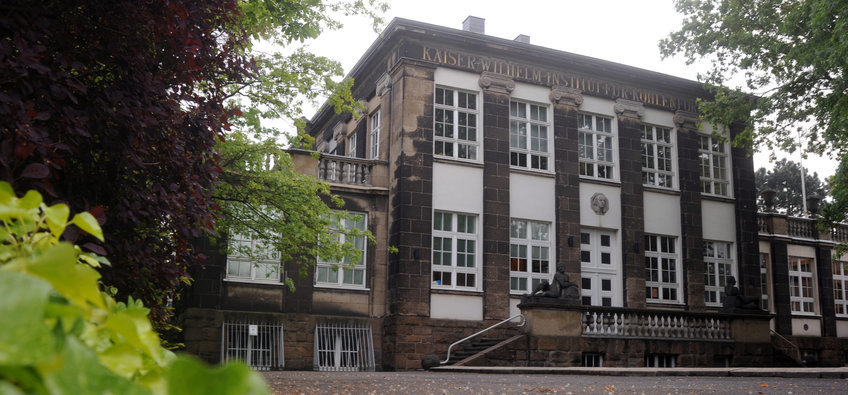
Former Directors
Franz Fischer (1877 – 1947)
Director 1913 – 1943
Franz Fischer studied chemistry at the Universities of Munich, Freiburg and Gießen, where he graduated in 1899 under the guidance of Karl Elbs with a thesis on chemical processes in lead accumulators. After a post-doctoral stint in Paris with the later Nobel Prize winner Henri Moissan, he gained his “Habilitation” at the University of Freiburg in 1903 with work on the anodic behaviour of copper and aluminium. He then joined the University of Berlin, where he worked at the Institute of the Nobel Prize winner Emil Fischer. In 1908 he became Professor and later “Chair” of Electrochemistry at the TH Charlottenburg (1911). In 1913, he was appointed Founding Director of the then Kaiser-Wilhelm Institut für Kohlenforschung, now the Max-Planck-Institut für Kohlenforschung. Together with Hans Tropsch, he developed the so-called “Fischer-Tropsch process” in 1925, which allows coal (or other carbon-containing feedstocks) to be converted into liquid fuels. This process is still in use today on large industrial scale. It is also thanks to Franz Fischer that the present MPI für Kohlenforschung became a Foundation under Private Law (1939).
Karl Ziegler (1898 - 1973)
Director 1943 - 1969
Karl Ziegler studied chemistry at the University of Marburg and graduated in 1920 under the tutelage of Karl von Auwers with a thesis on semibenzenes and related compounds. As early as 1923, he gained a “Habilitation” with work on tetra-aryl-allyl radicals and derivatives thereof. His further career took him to the University of Frankfurt and to the University of Heidelberg, where he was appointed Associate Professor in 1928. In 1936, he became Full Professor at the University of Halle and succeeded Franz Fischer as Director of the Kaiser-Wilhelm-Institut für Kohlenforschung in 1943. His most important scientific achievement dates from 1953: the discovery of organometallic catalysts, which allow polyolefins to be produced under unprecedentedly mild conditions via coordinative insertion polymerization of alkenes (“Ziegler catalysts”). This process continues to form the basis for the industrial production of plastics such as polyethylene and polypropylene; it also earned him the Nobel Prize for Chemistry in 1963, together with Giulio Natta. Other areas of interest were the chemistry of the alkali metals, radical chemistry (“Wohl-Ziegler allylic bromination”), and the synthesis of medium-sized and macrocyclic rings (“Ziegler-Ruggli dilution principle“, „Ziegler dinitrile method“). On the occasion of his 70th birthday, he endowed the “Ziegler Fund” in order to support the Max-Planck-Institut für Kohlenforschung. Together with his wife, he was a passionate collector of paintings by expressionist artists; the Ziegler collection is now part of the Mülheim Art Museum.
Günther Wilke (1925 – 2016)
Director 1969 – 1993
Günther Wilke studied chemistry at the Universities of Karlsruhe and Heidelberg, where he graduated in 1951 under the guidance of Karl Freudenberg. His thesis was entitled "Investigations on the formaldehyde-releasing group in lignin and model substances”. In the same year, he joined the research group of Karl Ziegler at the Max-Planck-Institut für Kohlenforschung. He gained a “Habilitation” at the RWTH Aachen in 1960. In 1963, he was appointed to the Chair of Organic Chemistry at the Ruhr University of Bochum and also became a Scientific Member of the Max Planck Society. In 1967, he declined a Full Professorship at the ETH Zurich for the position of Second Director at the Max-Planck-Institut für Kohlenforschung; in 1969 he became head of the Institute. Günther Wilke’s research was focused on the organometallic chemistry of nickel, which, in turn, strongly impacted on the development of homogeneous catalysis in general. In this context, his studies on the cyclodimerization and cyclotrimerization of butadiene deserve particular attention, as they arguably represent the first well-documented examples of ligand-controlled catalytic processes; moreover, these transformations are still used today on industrial scale. Therefore he is rightfully considered a “spiritus rector” of homogeneous catalysis.
Walter Thiel (1949 - 2019)
Director 1999 - 2018
Walter Thiel studied chemistry at the University of Marburg where he graduated in 1973 with a thesis on photoelectron spectroscopy under the guidance of Armin Schweig. From 1973 to 1975, he spent a postdoctoral stint in Austin/Texas in the group of Michael Dewar, where he developed the "Modified Neglect of Differential Overlap (MNDO)" method. This semi-empirical method was highly successful and gained tremendous popularity. After his return to Germany, he completed a “Habilitation” in Theoretical Chemistry at the University of Marburg (1975-1982). In 1982, he accepted a C3 professorship at the University of Wuppertal and became Full Professor at the University of Zurich in 1992. In 1999, Walter Thiel joined the Max-Planck-Institut für Kohlenforschung, where he established a Department of Theoretical Chemistry. His scientific work encompassed method development at different levels of theory (semi-empirical, DFT, ab-initio) as well as the use of these tools for a better understanding of various (catalytic) transformations. Particularly noteworthy are his contributions to the chemistry of cytochrome P450 and biocatalysis in general using QM/MM methods, as well as numerous studies into the mechanism of metal-catalyzed transformations. Further details can be found on his homepage.